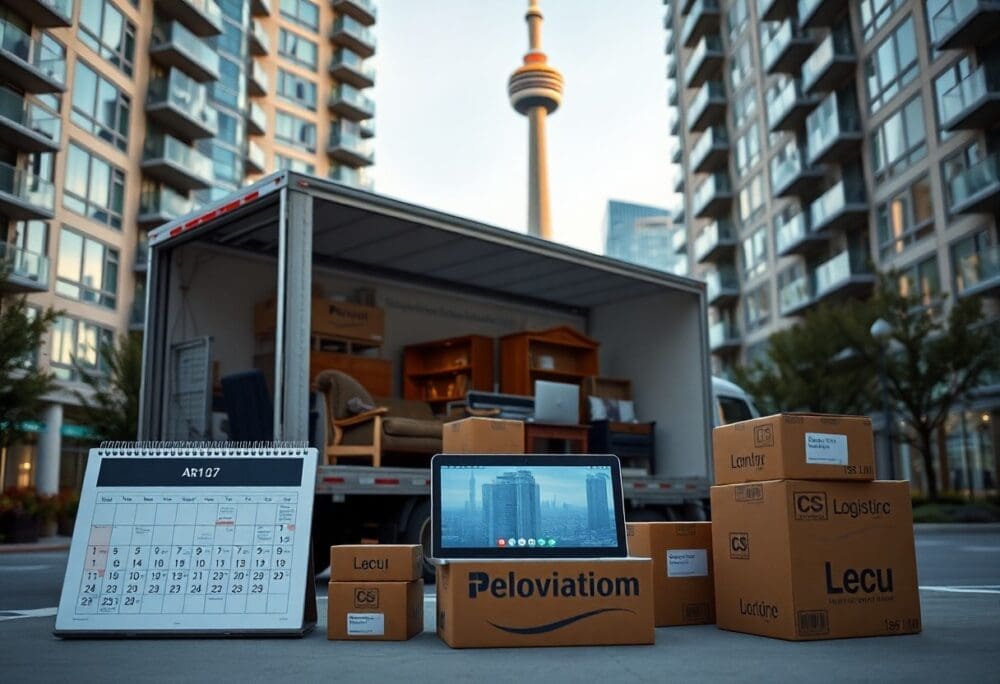You need to start planning your logistics for a move to Toronto well in advance to ensure a smooth transition. Ideally, aim to begin your preparations at least 6 to 8 weeks ahead of your relocation date. This timeline allows you to explore housing options, coordinate with movers, and settle any necessary paperwork without the pressure of a last-minute rush. By organizing early, you can also take advantage of potential discounts and better availability on services and accommodations, making your move less stressful and more successful.
Key Takeaways:
- Initiate logistics planning at least 2-3 months before the move to ensure availability of services and optimal pricing.
- Consider factors such as housing, transportation, and local amenities when selecting a neighborhood in Toronto.
- Research and book moving services early to accommodate peak moving seasons and to manage potential delays.
Understanding the Timeline for Relocation
Establishing a timeline for your relocation is fundamental to streamline your move to Toronto. Typically, you should aim for a comprehensive plan about 2-3 months ahead of your moving date, which allows you to align multiple tasks and responsibilities. This timeline helps in coordinating visits to potential neighborhoods, securing housing, and managing all necessary services through effective scheduling.
The Importance of Early Planning
Planning your move early significantly reduces stress and ensures that every aspect of your relocation is handled efficiently. By starting the process sooner, you can assess available housing options, book reputable moving services, and negotiate better rates. Early planning also grants you time to map out important logistics, allowing you to settle into Toronto smoothly.
Key Factors Influencing Your Moving Schedule
Several factors play a role in determining your moving schedule. Key considerations include your job start date, current lease expiration, and the availability of moving services. Moreover, if you have children, aligning their school schedules into your timeline is vital. Additionally, securing housing in advance can prevent rushed decisions, which often lead to increased costs and stress. Perceiving the full scope of these elements allows you to create a comprehensive plan that fits your needs.
- Job start date
- Current lease expiration
- Availability of moving services
- Family responsibilities
- Feedback from local contacts
Understanding the importance of these factors aids in creating an effective timeline for your move. Each component can influence your departure, arrival, and settling-in processes. Balancing personal obligations with logistical challenges is imperative. Evaluating your circumstances helps ensure a smooth transition to your new home in Toronto. Perceiving these influences upfront positions you for a more successful relocation experience.
- Personal obligations
- Logistical challenges
- Financial considerations
- Seasonal factors
- Local regulations
Researching Moving Options
When planning your move to Toronto, invest time in researching various moving options. Consider your budget, the volume of items to transport, and specific needs, like timing or special handling for fragile possessions. Detailed research allows you to shortlist the most suitable services that align with your circumstances, ultimately leading to a smoother transition to your new location.
Assessing Transportation Methods
Evaluate transportation methods based on your timeline and budget. Options range from DIY truck rentals, which can save costs, to full-service movers that handle everything for you. Consider factors like distance, the amount of belongings, and the convenience trade-off when making your decision.
Comparing Moving Companies
To find the right moving company, gather multiple quotes and check their credentials. Look for reviews and ask for recommendations from friends or online forums. Pay attention to services offered, pricing transparency, and customer service responsiveness, as these factors can significantly impact your moving experience.
Table: Factors to Consider When Comparing Moving Companies
| Factor | Importance |
|---|---|
| Service Offerings | Ensures your specific needs are met |
| Costs | Helps you stay within budget |
| Insurance Options | Protects your belongings during the move |
| Customer Reviews | Reflects the quality of service |
| Experience | Indicates reliability and expertise |
For thorough comparisons, seek out detailed reviews and testimonials about each company. Websites like Yelp or Google Reviews provide insights into customer experiences, helping you gauge service quality. If possible, request a site visit or detailed inventory to understand pricing and get a sense of professionalism. This groundwork enables informed choices, ensuring a seamless move to Toronto.
Table: Steps to Verify Moving Companies
| Step | Description |
|---|---|
| Check Licensing | Verify if the company is licensed and insured, especially for interprovincial moves. |
| Get Written Estimates | Request estimates in writing for clarity on costs and services. |
| Ask About Extra Fees | Inquire about any potential additional costs to avoid surprises. |
| Review Contracts | Read contracts carefully before signing to understand your obligations and rights. |
| Confirm Availability | Ensure the company can accommodate your moving date without conflict. |
Preparing for the Move
To ensure a smooth relocation to Toronto, initiate your preparation early. From securing housing to understanding local regulations, your to-do list can be extensive. Consult resources that outline timelines and checklists, like What is the best time to plan a long distance move …, to guide you through the process efficiently.
Packing Strategies
Effective packing strategies can save you time and minimize stress. Start by gathering all necessary supplies, such as boxes, tape, and bubble wrap. Use a systematic approach: pack room by room, label boxes clearly, and prioritize items that you need immediately upon arrival.
Inventory Management
Maintaining an accurate inventory during your move is crucial. Document every item you own and its condition, allowing you to track your belongings and identify any discrepancies post-move. Using spreadsheets or mobile apps can simplify this process.
Consider categorizing your inventory by room or function, which helps streamline unpacking in your new home. Additionally, take photos of valuable items for insurance purposes, and keep important documents accessible. An organized inventory contributes not only to efficiency but also to peace of mind during what can be a hectic transition.
Legal and Administrative Tasks
Addressing legal and administrative tasks is imperative for a seamless relocation to Toronto for work. This includes updating your official documentation and ensuring your presence in the city complies with local laws and regulations. Timing these tasks effectively can prevent delays in settling down and getting started with your new job.
Updating Your Address
Once you have your new address in Toronto, promptly update it across all legal documents, official registrations, and with your employer. Failing to keep your address current can lead to issues with tax filings and other important correspondence, which may affect your job and residency status.
Necessary Work Permits and Documentation
Obtaining the appropriate work permits and documentation is vital for your legal employment in Toronto. Depending on your nationality, job type, and duration of stay, you may need to apply for a work visa or permit prior to your arrival, which can take several weeks to process.
For example, if you are a foreign national, you might require a Temporary Work Permit or a Labour Market Impact Assessment (LMIA), especially if your role is not covered under the exemptions. The application process can sometimes involve submission of job offers, proof of qualifications, and other support documents. Ensure you check the latest guidelines on the Government of Canada’s website to avoid any compliance issues that could jeopardize your employment. Initiating this process beforehand can save you time and stress once you arrive in Toronto.
Settling into Toronto
Once you’ve arrived, the next step is settling into your new life in Toronto. It’s vital to immerse yourself in the city and build a support network. Engaging in local forums, such as Canadians who have moved long distances, how did you …, can provide valuable insights and tips from those who have successfully made the transition.
Finding Temporary Accommodations
When moving to Toronto, securing temporary accommodations can help ease your transition. Options like short-term rentals, hostels, or serviced apartments allow you flexibility while you explore neighborhoods and finalize long-term housing. Consider using platforms like Airbnb or local rental agencies to find suitable options that fit within your budget.
Exploring Neighborhoods
Exploring neighborhoods is a vital part of settling into Toronto. Each community has its own unique vibe and amenities, making it vital to find one that aligns with your lifestyle. Areas like Kensington Market offer eclectic shops and a vibrant arts scene, while neighborhoods such as The Beaches provide a laid-back atmosphere with easy access to the lake. Take your time to visit various neighborhoods, as your surroundings will significantly influence your overall experience in the city.
Finalizing Arrangements
Finalizing arrangements consolidates all logistics and ensures that your move to Toronto is smooth. Coordinating with your movers, confirming arrival times, and double-checking your inventory list are important steps. Additionally, solidifying your living arrangements and understanding key local services will position you for a successful transition into your new environment.
Confirming Details with Movers
Confirming details with your movers involves reviewing the final contract and clarifying any specific requirements. Make sure the moving date, time, and address are correctly listed, and discuss any potential concerns such as parking restrictions or elevator access in your new building. Clear communication can prevent delays on moving day.
Creating a Day-of-Move Checklist
Creating a day-of-move checklist will streamline your moving process. Include tasks such as verifying your inventory, packing important items separately, and ensuring utilities are set up at your new home. Organizing everything in advance minimizes last-minute chaos and helps you stay focused during the transition.
Your day-of-move checklist should outline the most significant tasks in an orderly fashion. Start with securing all documents related to your move, including contracts and contact numbers for your movers. Next, include reminders for items like snacks, beverages, and necessary tools for quick access. Scheduling your time effectively on moving day ensures you’re prepared for any unexpected occurrences while keeping everything running smoothly.
Summing up
So, when planning your move for work to Toronto, it’s important to start logistics at least two to three months in advance. This timeframe allows you to secure the right moving company, manage any necessary paperwork, and address potential challenges effectively. For specific guidance on timing, refer to How Far in Advance to Schedule Movers. Early preparation ensures a smoother transition and helps you focus on your new professional journey.
FAQ
Q: How far in advance should I start planning my move to Toronto for work?
A: It is advisable to start planning your move at least 3 to 6 months in advance. This timeframe allows you to explore housing options, secure a moving company, and manage any necessary paperwork or arrangements for your job relocation.
Q: What specific logistics should I consider when moving for work to Toronto?
A: Key logistics to consider include researching neighborhoods, finding suitable housing, arranging transportation for yourself and your belongings, and understanding the local amenities and services you may need upon arrival, such as schools, healthcare, and grocery stores.
Q: How can I find reputable moving companies for my relocation to Toronto?
A: Start by asking for recommendations from colleagues or friends. Additionally, use online resources to read reviews, compare quotes, and check the credentials of moving companies. Look for those with experience in long-distance relocations and positive customer feedback.








